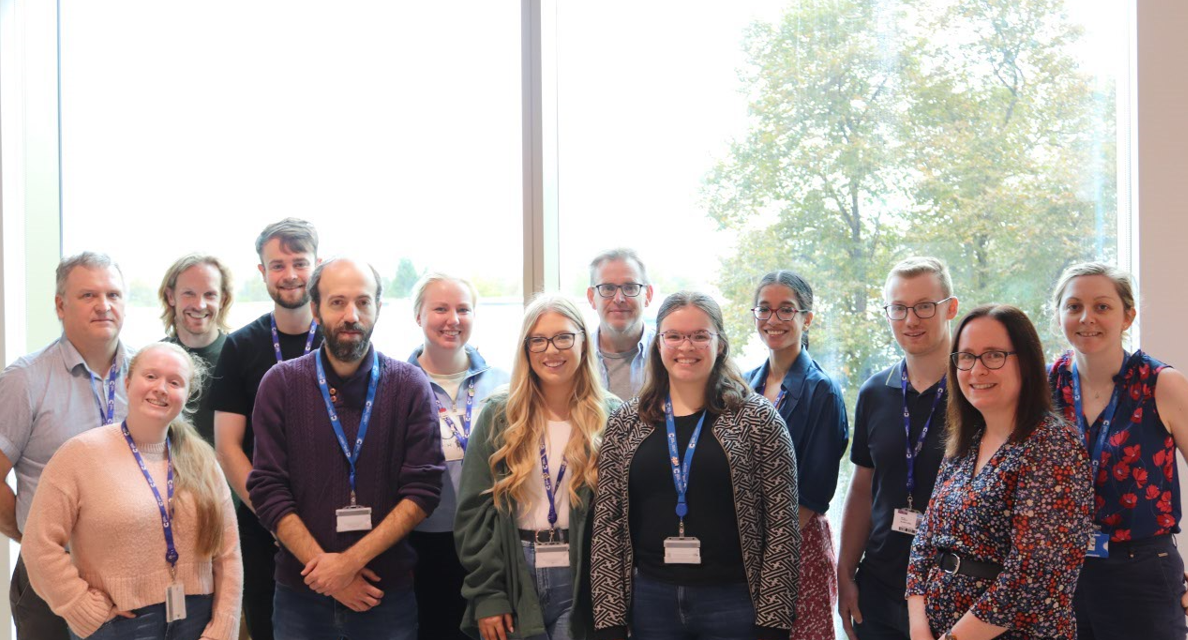Closing date: 07/03/2025
MB-PhD Project: Smaller, Better, Faster, Stronger: real-time colorectal cancer management using nanopore sequencing
Lead Supervisors: Dr Florent Mouliere
Co-Supervisors: Dr Kalena Marti, Dr Michael Braun, Dr John Knight, Dr Dominic Rothwell
Applications Deadline: Friday 7th March 2025
Project Keywords: Nanopore sequencing; Colorectal cancer; Liquid biopsy
Research Opportunity: Intercalated PhD, leading to the award of PhD and MBChB
Project Outline
Colorectal cancer (CRC) is ranking among the leading causes of cancer-related morbidity and mortality and where early onset is increasing. Timely and accurate diagnosis is crucial and traditional diagnostic methods, though informative, are slow, often taking weeks, hindering swift clinical decisions in CRC. Liquid biopsy and cell-free DNA (cfDNA) are alternatives for biomarkers, but current methods share limitations in analysis turnaround time. Sensitive analysis in blood is challenging due to the dilution of tumour signal.
Nanopore sequencing is a promising technology for cancer diagnostics. Utilizing protein nanopores, it directly sequences DNA offering real-time sequencing, long-read capability, combined with high portability. In CRC, nanopore sequencing shows promise for swiftly detecting mutations and structural variations compared to conventional methods. In other malignancies, nanopore coupled with AI analysis determines cancer subtypes within hours, even during surgery. However, sensitivity may be limited compared to the commonly used short-read technologies in liquid biopsy applications.
Our aim is to develop a nanopore sequencing method for identifying genetic and epigenetic patterns in CRC tissue and liquid biopsy within <24 hours of sampling.
The research plan consists in:
- Improving the sample preparation to accelerate the isolation of cfDNA from hours to minutes using banked control plasma.
- Developing a CRC gene panel for the deep sequencing of mutation from targeted loci.
- Developing a protocol for the genome-wide analysis of mutations and methylation from plasma and tissue samples based on standard native DNA nanopore sequencing.
- In collaboration with bioinformatician, implementing the code to perform the sequencing analysis in a reproducible and fast manner.
- In collaboration with AI specialist, supervising with deep learning the analysis of data to accelerate the turn-around time of reporting interpretable results.
- Applying the approach to a range of clinical samples from CRC patients to matched banked tissue and blood samples from patients before therapy (MCRC biobank) alongside a new prospective sample collection.
About Prof. Florent Mouliere (project Lead Supervisor)
Florent is a team leader at the Cancer Research UK Cancer Biomarker Centre, University of Manchester and assistant professor at the UMC Amsterdam.
His interests are developing new technologies and multi-omics analysis to study extracellular biology, and nucleic acids in cancer and other pathologies.

About the lab group
Find out more about the lab group involved in this project and how we support your wellbeing, learning and career development.

As a PhD lead supervisor, my primary goal is to foster a dynamic and intellectually stimulating research environment that cultivates curiosity, innovation, and academic excellence toward translational research. In my lab, we prioritize a multidisplinary and collaborative culture where diverse perspectives are valued and encouraged. I aim to create an atmosphere where communication is open and direct, and team members feel comfortable sharing ideas and challenging each other’s thinking.
I have high expectations for research quality and rigor, and I believe in setting ambitious yet achievable goals. Regular meetings will be planned to track progress, addressing challenges, and refining research directions. I encourage a proactive approach to problem-solving and expect students to take ownership of their projects. Additionally, I value the importance of convergence science and aim to facilitate opportunities for students to engage with scholars from various fields.
All students provide presentations within lab meetings on a regular basis to engage with their laboratory group. For formal supervisor meetings, students should be able to discuss and show understanding of their project to a high level, with the meetings designed primarily to support and give constructive advice to the student.
Guiding toward independence is a key aspect of my mentoring philosophy. I will provide personalized guidance via one-to-one meetings, constructive feedback on reports, and creating opportunities for students to showcase their work during weekly lab meetings, and monthly centre meetings. I am committed to supporting their career development by providing mentorship on research skills, networking, and navigating academic, service or industry landscapes. I believe in nurturing not only their academic abilities but also their professional skills, ensuring they are well-prepared for diverse career paths.
The Cancer Biomarker Centre (CBC) is a welcoming environment, where basic, translational, and clinical scientists work in tandem with mutual respect. CBC students are embedded in a supportive network of integrated teams with day-to-day supervision by team leads and deputies. We have 3 clinical fellows and 9 students currently.
Recognising the importance of work-life balance, I am dedicated to creating an environment that supports the well-being of my students. I advocate for a healthy integration of work and personal life, promoting strategies for time management and stress reduction. I prioritize a supportive culture that understands the challenges individuals may face and encourages open communication to address and accommodate those needs. Overall, my goal is to guide students towards successful and fulfilling academic and professional journeys while fostering a positive and balanced lifestyle.
Key information
Find answers to some common questions about our MB-PhD Studentships.
To apply to intercalate onto the PhD in Cancer Sciences component of the MB-PhD, you must meet the below criteria and satisfy the general requirements for permission to intercalate set by your institution, including passing all components of the MBChB at first attempt in the year prior to intercalation.
A University of Manchester MBChB student
- holding a BSc (hons) 2.1 or above in a relevant subject and in year 2 or year 3 of the MBChB or year 1 or year 2 of GEM; or
- currently studying in year 3 of the MBChB or year 2 of GEM
A University of St Andrews Medicine BSc (Hons) student on the Manchester course pathway:
- holding or predicted a BSc (hons) 2.1 or above and be intending to intercalate straight onto the MB-PhD ahead of your arrival in Manchester or by no later than between year 3 and year 4 of the Manchester MBChB programme
A University of Leeds MBChB student:
- currently studying in year 3 of the MB ChB
International applicants (including EU nationals) must ensure they meet the relevant academic eligibility criteria (including English Language).
The PhD component of the MB-PhD studentship is usually funded for three years, or four years in exceptional circumstances with prior agreement of MB-PhD Committee and supervisory team.
The studentship covers:
- An annual stipend of £21,000 per year to help with living costs
- Full funding for your PhD tuition fees (at the UK rate, with fee bursaries available for high-performing EU/International candidates)
- PhD project consumables and running costs, including costs for researcher development such as conferences and travel
- MBChB tuition fees (at the UK rate) for a maximum of four years
Here are our quick steps to apply for our MB-PhD:
1. Eligibility
First, you need to check you are eligible to apply for an MB-PhD. Please see the eligibility tab (above) to read all criteria.
2. Contact supervisors
You can explore the range of MB-PhD opportunities that are open to application on our Research Opportunities webpage.
We encourage you to contact the supervisor of any MB-PhD projects that you are interested in before starting your application. Having these conversations will help you to get a feel for the different research themes and projects on offer.
3. Register
Register to apply for our MB-PhD opportunities using the Postgraduate Application Form. You must create an account to register.
4. Create a new application
When you create a new application make sure you select the following:
- Academic Career – Postgraduate Research
- Mode of Attendance – Full-time
- Program Description – search for MB-PhD and then select the MB-PhD Programme
- Candidates apply for the MB-PhD programme – under ‘Research Title’ list MB-PhD Programme. You can provide supervisor preferences/research interests in your accompanying supporting statement and these will be considered at and after interview
- If you are shortlisted, you’ll be interviewed by the MB-PhD Programme Directors and Education Committee before being accepted onto the programme “in principle”. You will be matched with a supervisor based on your interview performance and project/research preferences
- If successful at interview, you will be asked to meet with a nominated MB-PhD supervisor in the subsequent week for them to review and approve your PhD offer
- For funding sources, please include the following information:
– Select ‘Yes’ from the drop-down
– Type of Funding: University of Manchester Scholarship
– Awarding Body: Cancer Research UK MB-PhD
– Status of Funding – Awarded
– Funding Covers – Fully Funded
– Leave the remaining boxes blank
5. Supporting documents
Your application form must be accompanied by several supporting documents:
CV
This should include:
- qualifications (GCSE, A-level or equivalent, and any higher education qualifications, including grades, and your current programme)
- academic prizes, research projects, and academics interests
- extracurricular interests, and activities and positions of responsibility relevant to your application
The information you provide in your CV will be considered in relation to widening participation, and/or university access policies, to ensure that all applicants are treated fairly.
Supporting statements
This should be 1,000 words maximum and include your reason for applying to the MB-PhD programme and your interest and suitability for the project. You can include project/research interest/s here and these will be considered at and post-interview.
References
You need to list two referees, one of which must be an academic referee from The University of Manchester, The University of Leeds or The University of St Andrews-Manchester pathway MBChB programme.
This could be a:
- Clinical debrief tutor
- PEP tutor
- Literature research project supervisor
- PPD tutor
References cannot be submitted by a supervisor named on the project you are applying for.
Supporting documents can be uploaded and submitted with the online application form.
If you have any issues, your supporting documents can be sent directly to the Doctoral Academy Admissions Team at admissions.doctoralacademy@manchester.ac.uk, CC’ing in mcrctraining@manchester.ac.uk.
6. Acknowledgement and review process
Once you have submitted your application form, we will email you with an acknowledgement.
We will review your application after the application deadline and once we’ve received all your supporting documents. If successful at interview, we will also share your application with a nominated supervisor(s) to review.
7. Interviews
7. Interviews
We will email you if you are invited to interview.
Interviews will take place at the Oglesby Cancer Research Building in Withington in Spring 2025.
8. Applying to intercalate
UoM MBChB students must complete an intercalation Expression of Interest form by Friday 24th January 2025 (we may be able to consider late applications to intercalate in exceptional circumstances). This form is available on 1MedForms via the following link: https://www.onemedforms.manchester.ac.uk/
UoL MBChB must apply to intercalate via UoL processes by Friday 24th January 2025.
University of St Andrews Manchester pathway students can contact mcrctraining@manchester.ac.uk for guidance.
Key dates
- Intercalation deadline: Friday 24th January 2025
- Application deadline: Friday 7th March 2025
- Interviews: w/c 28th April 2025
- Start date: September 2025
Useful Links
MB-PhD Studentships
Find out more about our MB-PhD Studentships which allow you to study a fully-funded PhD alongside your medical degree.
Get in Touch
Contact Dr Georgina Binnie-Wright, Postgraduate Programme Manager.
A Day in the Life of an MCRC MB-PhD Student
Watch our short video to see what it's like to be an MB-PhD student in Manchester.
Researcher Stories
Read first-hand experiences of from cancer scientists from across Manchester.
Why Manchester?
Find out why postgraduate students choose to study in Manchester.





